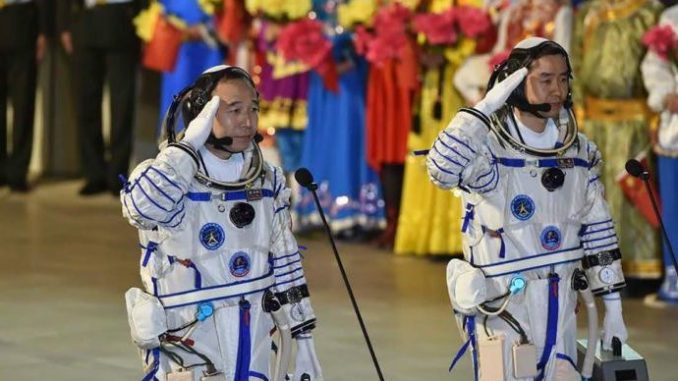
China launched two astronauts into space Monday, official media said, on a mission to its orbiting laboratory as the country works towards setting up its own space station.
The Shenzhou-11 spacecraft blasted off early in the morning from the Jiuquan Satellite Launch Centre in the Gobi desert, the official Xinhua news agency reported.
Astronauts Jing Haipeng and Chen Dong will take two days to reach the Tiangong-2 space lab, or “Heavenly Palace-2”, which was launched in September.
They will remain on board for 30 days — the longest stay thus far by Chinese astronauts — to conduct tests on spacecraft-related technologies and scientific and engineering experiments, Xinhua said.
Jing, the mission commander, was on his third trip into orbit and will celebrate his 50th birthday in space.
“Although the job is challenging, risky and dangerous, there is nothing else I’d rather do,” he said, according to the China Daily.
China is pouring billions into its military-run space programme and working to catch up with the US and Europe, with hopes to have a crewed outpost by 2022.
Beijing sees the programme as symbolising the country’s progress and a marker of its rising global stature, but so far China has largely replicated activities that the US and Soviet Union pioneered decades ago.
Chinese President Xi Jinping sent a congratulatory message to the mission on Monday, urging them to aim at taking great leaps for the Chinese nation, Xinhua said.
The mission should work to ensure “the Chinese people will take bigger steps and march further” in space, and contribute “to the building of China into a space power”, Xinhua cited him as saying.
– ‘Divine vessel’ –
The Tiangong-2 lab is in orbit 393 kilometres (244 miles) above Earth and has two cabins — an hermetically sealed experiment chamber that doubles as the living quarters, and a resources store holding supplies such as solar panels, engines and batteries.
Russian space system design expert Aleksandr Zheleznyakov told Xinhua that the lab’s structure indicated China’s design plans for its future space station, which he expected would have a core cabin with multiple docks for different modules.
The two astronauts on the Shenzhou-11 (“Divine Vessel”) mission will test their own health in zero gravity, cultivate rice samples, and conduct research on cold atomic space clocks that use laser cooling technology to improve accuracy, among other projects, China Daily said.
They will be allowed a two-hour break every evening to watch movies, listen to music and make video calls home, it added.
“We prepared more than 100 kinds of food and beverages for them in space,” deputy director of China’s manned space engineering office Wu Ping told the paper, adding that they had access to a treadmill and exercise bike.
Chen, a 37-year-old from central Henan province with twin sons, idolised his older colleague earlier in his own career.
“I used to watch Jing on television and he always seemed so far away,” he said. “But when I met him in person, my worries and anxieties disappeared.”
Source: Today.ng
